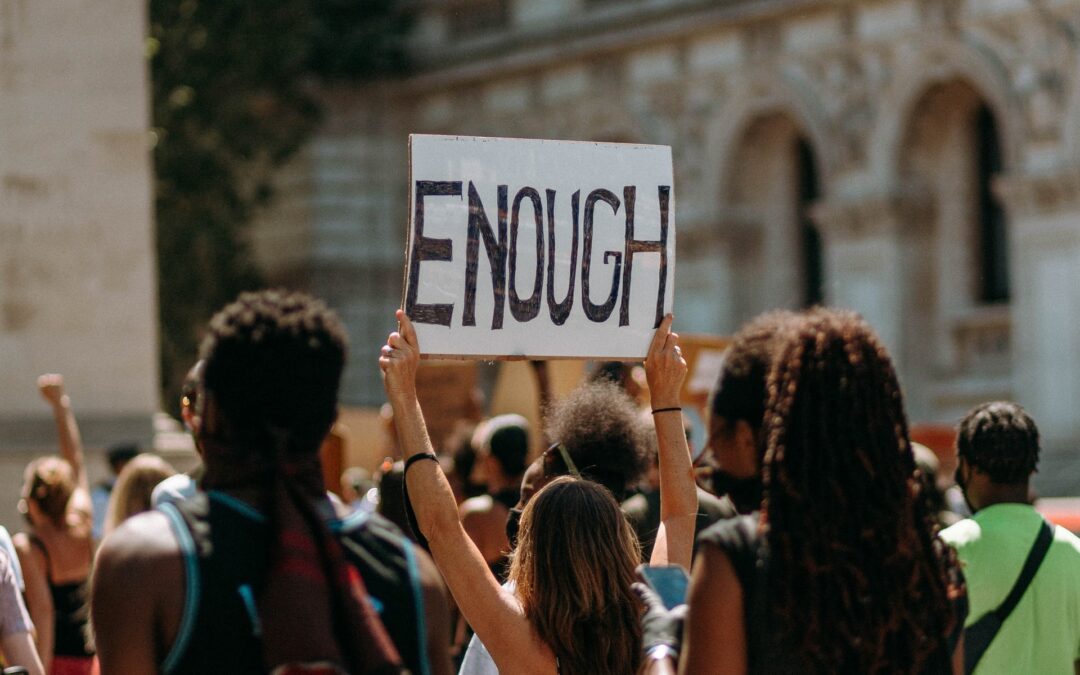Photo credit: Liam Edwards
“This is the front row ticket I didn’t ask to buy,” my classmate shared with me on video chat. A professor in our graduate mental health counseling program recently shared his views on race on his YouTube channel—the views protest discrimination against white people and the damage it causes to academic higher learning.
It has been quite a year. We’ve likely lived one headline or more, or know someone who has. This is not the year to be famous.
Any of us who are consciously working on ourselves already know that there are many Americas. Racial oppression is not only centuries-old in the United States and built into our systems and psyches, “downloaded into our minds without our permission” as one of my teachers says, but the oppression is also in clear and tragic headlines in recent years. For some, these headlines are their lives, their family, their friends, and community. Old patterns loom large, since the Nina, the Pinta, and the Santa Maria. It feels like racism is a virus that is genius at mutating to stay alive.
In his video, the professor directly connects his grievances about diversity and equity missions in academia and a perceived conflict with colleagues within our counseling program. The fairly large university I attend keeps diversity and equity at the forefront of hiring employees, teaching classes, and creating policies.
I don’t want to encourage gossip or increased views of the public video– which is by the way a recruitment to create community amongst white people who feel discriminated against by such measures in academia. There is intentional lack of detail here in this post. In combination with how he runs his courses (which I experienced firsthand since September), and the way he treats students, the much-viewed video created chaos in our program. It drew local media attention, caused a reorganization in our counseling program, and flooded the dean and provost with emails.
It made some of us even more afraid. Just, afraid.
According to the Preamble of the 2014 American Counseling Association (ACA) Code of Ethics, social justice, honoring diversity, and embracing multicultural approaches are infused right into the mental health counseling profession. It made some of us sick, if not terrified, to suddenly have one of our professors be a social media figure promoting the value of white victimhood, and similar subtexts implied.
Activists organized in response, many coming forward sharing past experiences with this professor, and responsive meetings between the dean, faculty, alumni, and current counseling students were necessary.
I suspected this professor’s personal/political stance during my first two weeks of class last September, when one of our assignments was to watch a journalistic roundtable comprised of people of color (POC) agreeing essentially there was no such thing as racism—personal responsibility rises above all. I was enrolled in one of his courses this semester as well when he made the video and posted it mid-March. Stomaching the video, the additional public social media feeds associated with him, the comments of support from outside the university, and the biracial efforts of activism that struggled to accomplish a holistic response to hold him accountable were complicated and heavy to suddenly navigate in the middle of the semester.
I struggle with finding beauty or grace in this, to this minute. This is a tenured professor in a centuries-old institution, and some want him gone. Me included.
White patriarchy is leaving its footprint on my heart and soul.
Here’s where I find the grace: the university’s ongoing positive response (doing more than “just talking”), the programs immediate offering of an alternative course section (which I switched into, away from this particular professor’s class), the high number of my colleagues who chose to opt out of his class or to a new advisor, the support and guidance of the faculty and dean, and the humility and thoughtfulness of my colleagues who made activism efforts that were not received well by alumni or current students—yet the effort is made, and still being made.
It’s all in forward motion. As the days of the semester march on, and he is still with our university, the heavier it feels… and the more determined I am to live up to the ACA Preamble and be an ethical counselor who honors as many kinds of people as intersectionally possible. (See a powerful TED Talk by Kimberly Crenshaw *here*.)


Recent Comments